You have taken the time to meticulously place every word in your resume. You wrote, rewrote, and rewrote again your cover letter more times than you can count.
Now you have reached the point where it comes all together: the job interview where you will meet the people that could make or break your career.
Odds are you won’t want to leave this one up to the luck of the draw.
Interviewing for a job can be an anxiety-producing experience. In fact, 92% of adults in the U.S. have job interview anxiety [1].

From preparing your outfit, deciding what you are going to say, and making sure you have enough time to make your appointment, job interviews can be one of the most stressful parts of the employment seeking experience.
Even the most capable job-seekers need some practice in front of the mirror before meeting a hiring committee.
Winging it is a sure-fire way to flub an interview and ruin any prospective employment chances. Interviewers will assume you did not put in the requisite time and effort and are not really invested in the job.
From basic research on the company and job position to picking out your outfit, pre-interview planning is an integral part of the job interview process.

Only about 2% of applicants on average receive a job interview [2], so if you do get selected, take some solace in the fact that you are already on the higher end of applicants.
Education plays one of the most important roles in candidate selection and employability. According to NCES, the employment rate of young adults (25 – 34 year olds) is 59% for those that haven’t completed high school and 86% for those that hold a bachelor’s degree or higher. That is a staggering difference. 72% of those who had completed high school are employed, but graduating from a college (no bachelor’s degree) increases employment rate to 79% [3].
Employment rates also vary by gender, age and, most importantly, by the career path that you take. U.S. Bureau of Labor Statistics releases job outlook statistics for every occupation. Generally, healthcare professions are usually in the highest demand and if you’re considering a career change, have a look at our hand-picked lists of massage therapy or physical therapy assistant schools.
When the day arrives, you want to make sure that you have everything 100% prepared.
Luckily for you, we are here to give you some tips meant to help you out on the big day.
How to Prepare for a Job Interview
Even before you even step in the interview room, you need to start preparing.
The average interview process takes about 22 days [4]. Keep that in mind when preparing for a job interview and don’t be discouraged if you do not hear back from the interviewer straight away.
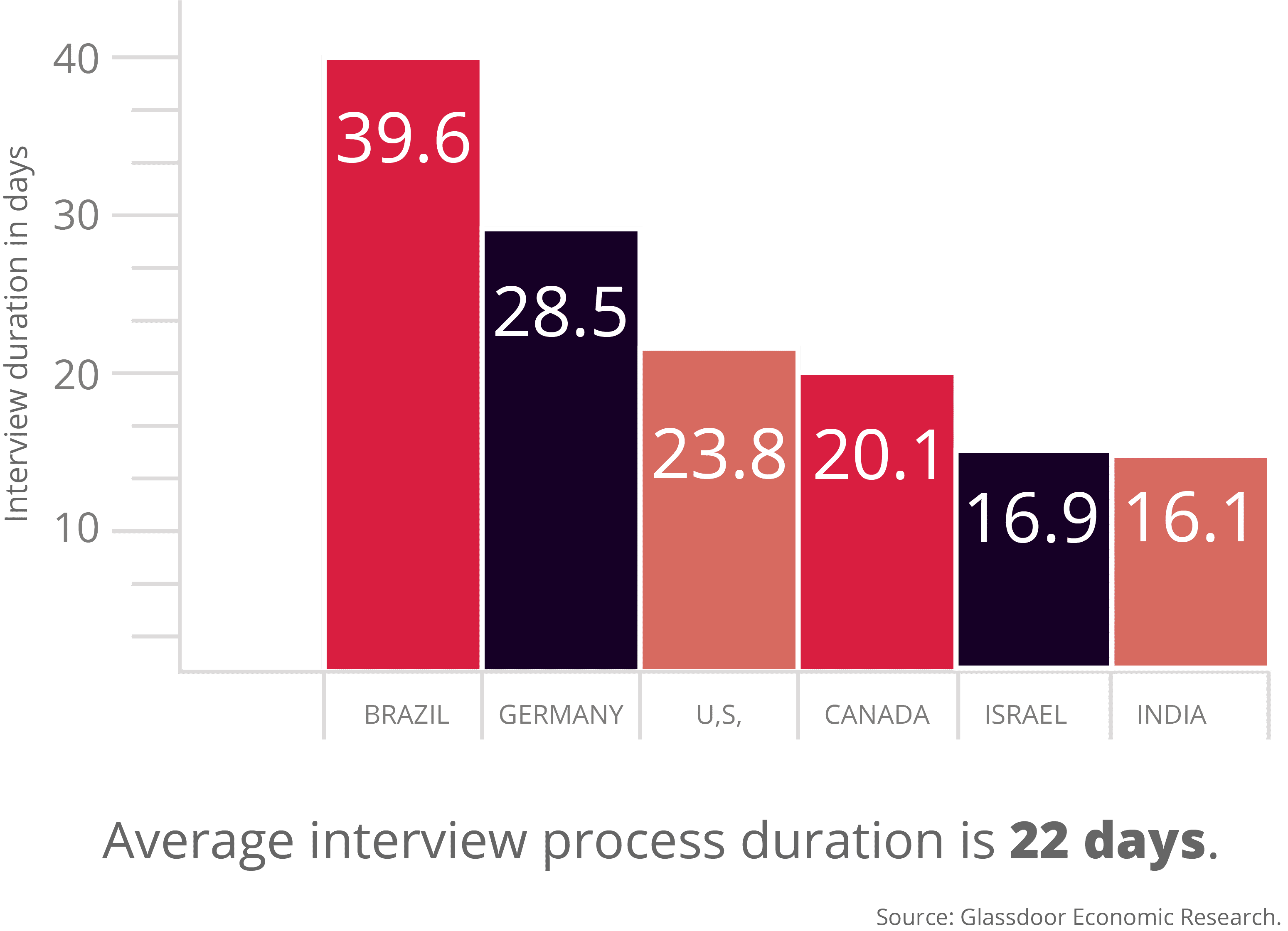
As soon as you schedule a job interview, start preparing. You can begin by going through a job description again.
Examine the Job Description
This one might seem obvious, though you would be surprised how many people step into the hot seat without an exactly clear picture of what position they are interviewing for.
You basically want to use the job description as a guide for what you are going to say.
Job descriptions list the qualifications, background, and qualities ideal candidates will possess.
The more you can present yourself in line with theses details, employers will perceive you as more qualified.
Job descriptions also give a good clue on what kinds of interview questions to expect.
Study Up On The Company
Knowledge is power and this holds true in the context of job interviews.
You should spend a good deal of time researching the company you are interviewing for. This research can include reading industry publications, blogs, and professional associations’ social media pages.
Try to remember a few statistics so you can impress the managers with your awareness of current business trends.
You should also learn about the company itself. Read through past press releases, financial statements, shareholder reports, and traditional media stories.
Learning all this information will help you ask good questions during the interview. Lastly, you should do some research on the company culture. Lookup the company on an employee review site like Glassdoor and see what previous and current employees have to say about the working conditions.
Twitter is also a great website to keep up with companies and employees of the company.
Check Out The Interviewers
If you know the names of the people interviewing you, look up their names on the internet to see their professional experience and what they talk about on social media.
You may find that that they have a particular interest in a certain aspect of the company, such as it’s employee education programs. Make sure to express your appreciation for these aspects (but don’t overdo it).
Other things you can connect on are music, hobbies, and mutual friends/previous employers/etc. – anything you can use to build a rapport.
Know Your Resume Backward and Forward
Your resume is the main way your interviewers will get info on you and will affect how they ask you questions.
They could pick specific entries and ask you to elaborate or describe the experience working for a past employer. Even if that job was from years ago, interviewers may pick and you are required to give an answer.
Study up and make sure you can recite your employment history, qualifications, and other relevant experiences off the top of your head.
As a general rule of thumb, it is considered good practice to bring enough hard copies of your resume for yourself and each person of the interview committee. The shift to electronic documentation is changing this trend though.
Nail Your Intro
It is true that first impressions matter. According to a study in the Journal of Occupational and Organizational Psychology, almost a third of surveyed interviewers say they knew whether they would hire someone in the first 90 seconds of the interview [5].
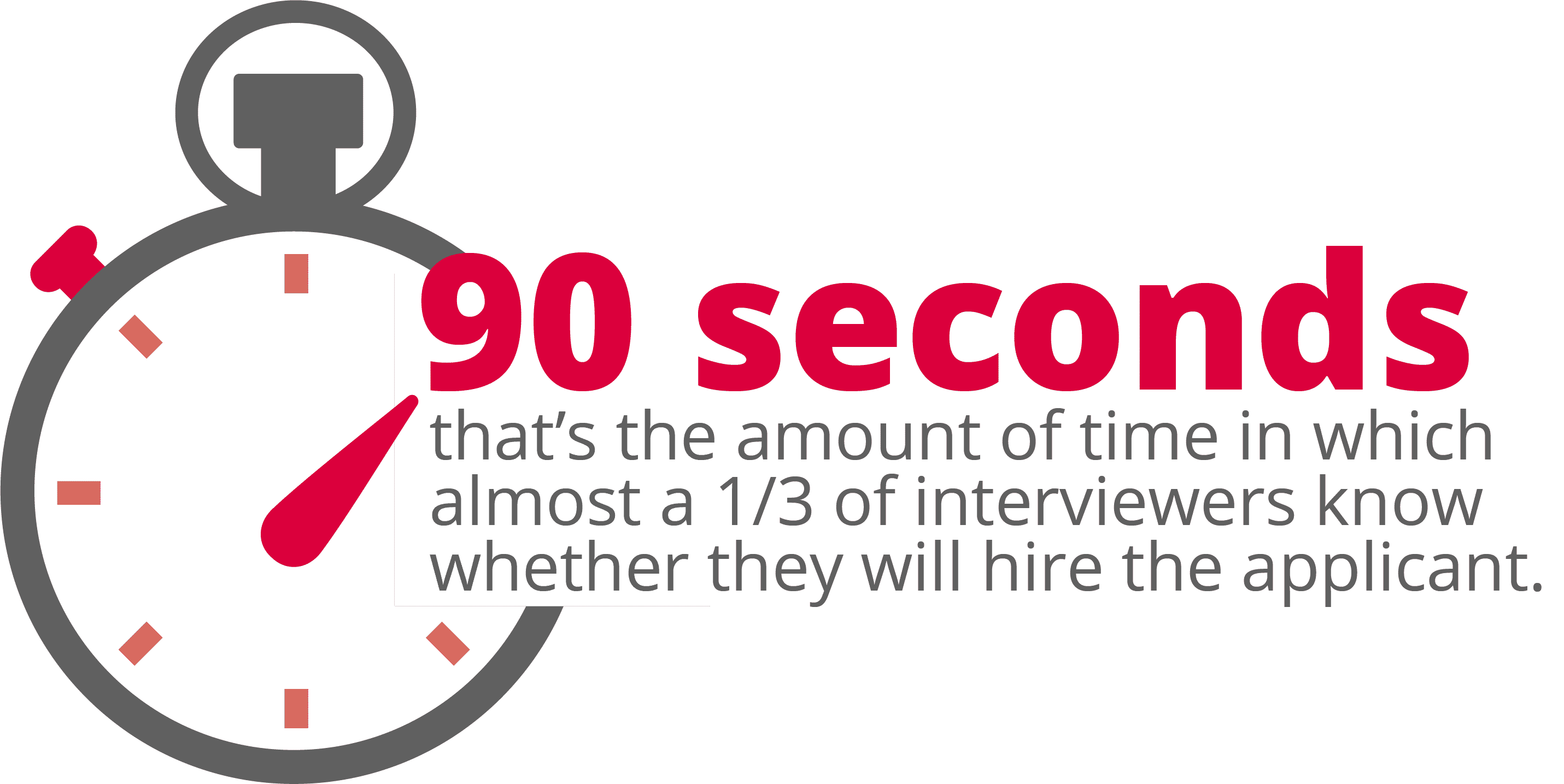
That is why it is important to have a good introduction prepped and ready to go.
An extremely common opening question is a simple “tell me about yourself”.
Hiring managers recommend having a quick “elevator pitch” that describes your experience, skills, abilities, successes, and what you are looking for in the future of your career.
You should also brush up on your handshake game. A firm greeting handshake with a friendly smile gives off the right energy that will start an interview off well.
Know Your Strengths and Weaknesses
Now you need to focus on the most important questions in the interview, the ones about your job history and work qualifications.
You need to have your responses tailored to show how you can have a positive impact on the company.
Interview answers should notify them of your unique selling points. For each question, you should be able to recount an experience that shows that you have the desirable qualities.
Never answer in generalities; you need to tell a story that demonstrates the things you say you are good at. Studies show that experienced interviewers are good at judging a candidate based on the “Big 5” personality assessment [6], so it is important you are honest about those things.
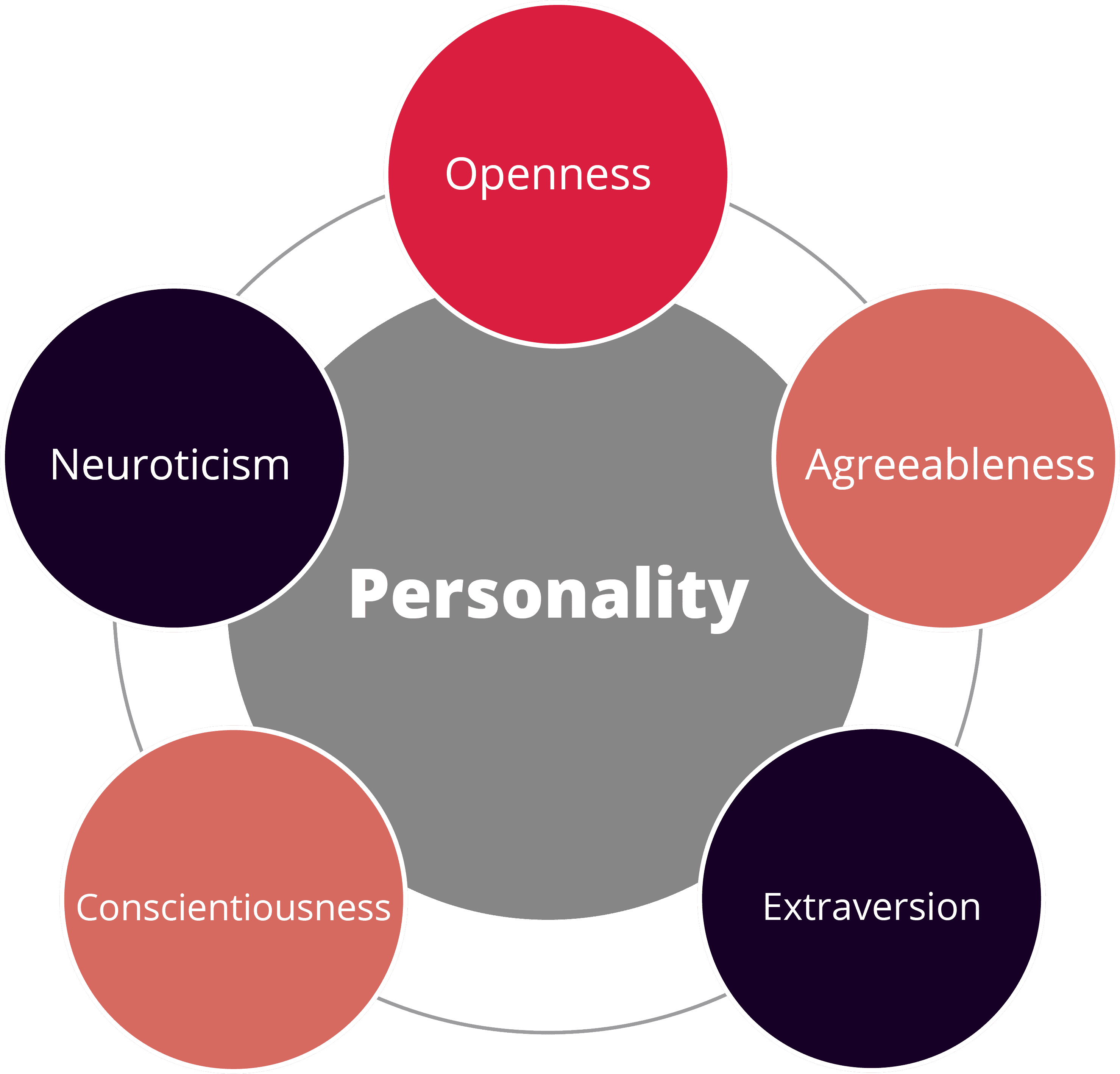
It is also important to know your own weaknesses. Admitting to faults and flaws shows your honesty and builds trust with the interviewing committee.
When telling any weaknesses, be sure to mention how you work to improve those qualities and manage them in the workplace.
Employers like to see someone who is committed to improving their performance.
Prepare Relevant Questions
Generally, hiring committees end an interview by asking “Do you have any questions for us?” Even if you have done a lot of research and are well-informed, don’t leave the interview seat before you ask some questions.
Closing questions is a good time to inquire about company culture and the position itself. In many ways, an employee interview is also an employer interview; you should be as interested in the company as they are you.
Pick Out Your Interview Outfit
You don’t have to be a genius to realize that wearing a stained t-shirt and jeans to a job interview is probably a bad idea. Like it or not, physical appearance and presentation are important factors that affect hiring decisions [7].
Good grooming and clothing choices signals to employers that you are organized, neat, clean, and can stick to a routine.
Journal of Business and Media Psychology performed a study to see whether physical attractiveness had an impact on the appraisal of presentations, their findings were surprising – physical attractiveness significantly enhanced assessments of the presenter and of the presentation itself [8].
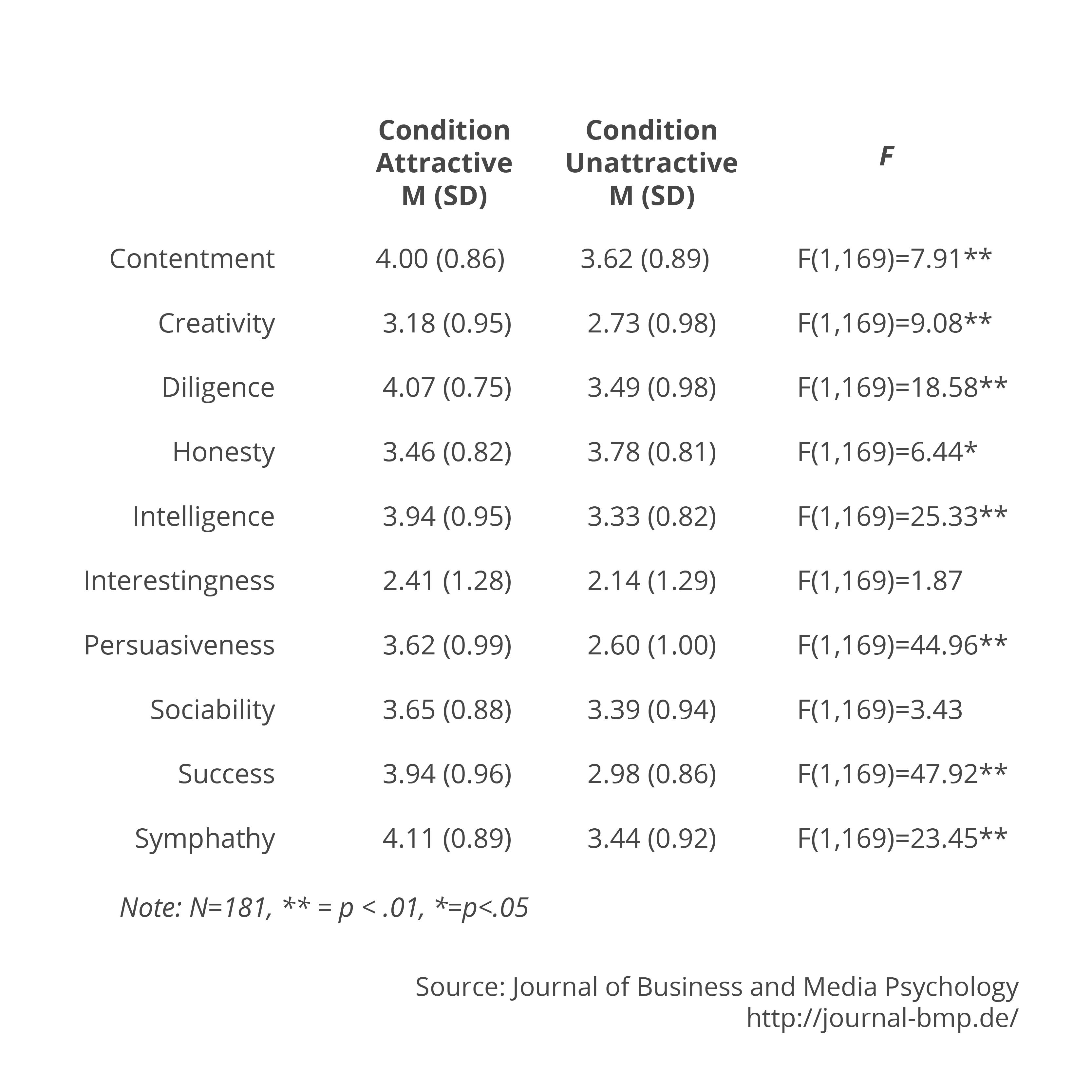
Giving a presentation and attending a job interview is similar. When you attend a job interview, you present yourself and you’re being judged by the interviewer.
You should consider buying a couple sets of nice interview clothes that you can mix and match.
Some interviews may require a shirt and tie while others may be more business casual. Whatever the dress code, make sure your shirt and pants are ironed, shoes are cleaned, beard is trimmed, hair is combed, and whatever else you need to exude a persona of sophistication and professionalism.
Fix Up Your Social Media Accounts
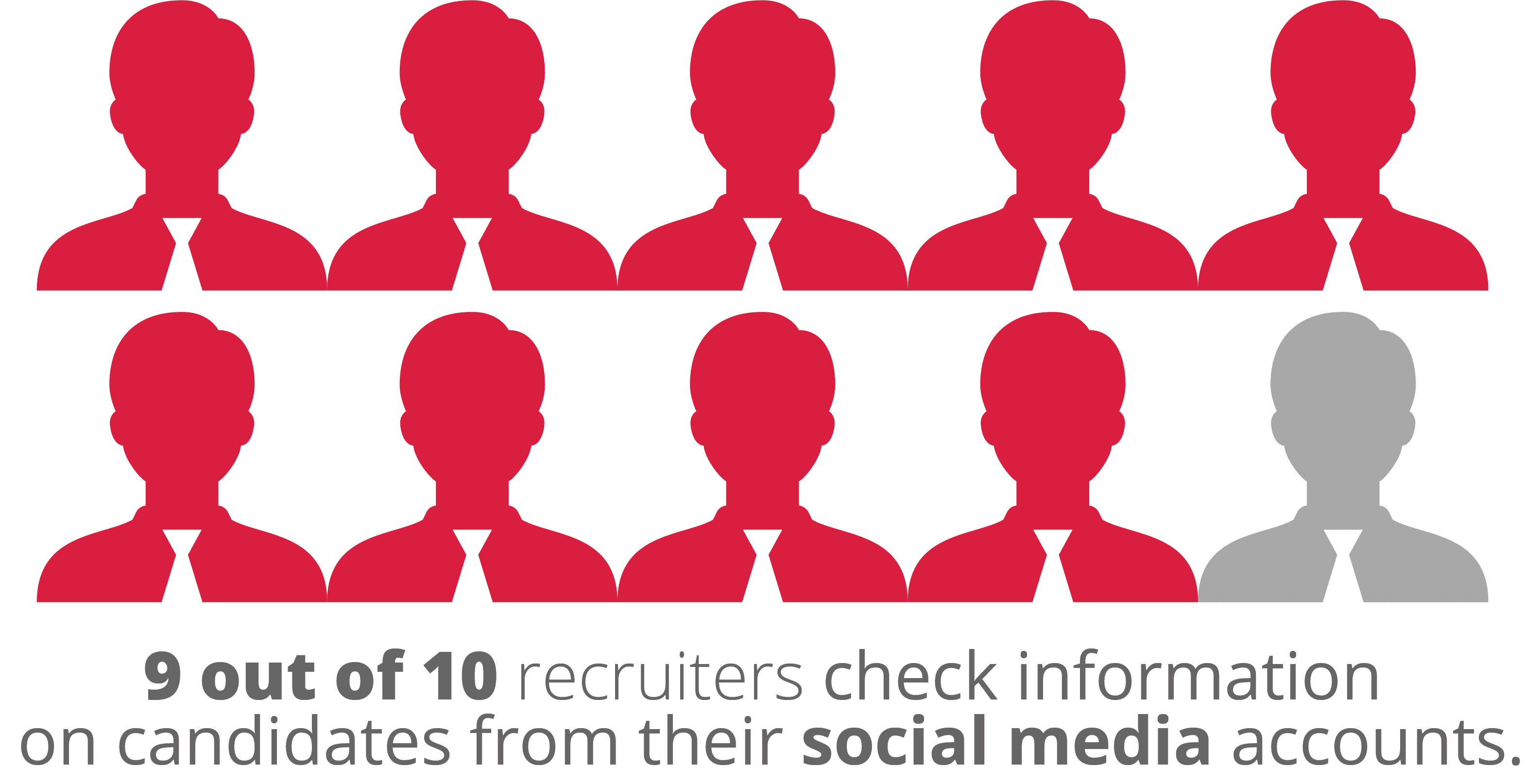
More and more, employers are resorting to social media pages to find information about candidates for hiring decisions [9].
The upside is that they can get a clear character profile from looking at social media, but the downside is that any red flags will be immediately obvious and could hurt your employment chances.
According to a recent study by Jobvite, more than 9 in 10 recruiters and hiring managers get info on candidates by looking at their social media profiles [10].
Take some time to go through your social media accounts to get rid of any incriminating details.
While you may like that funny picture of your smashing two beer bongs last spring break, employers probably will not appreciate seeing that side of you on social media.
Practice, Practice, Practice
Practice makes perfect and the same is true in the interview ring.
Practice your entire interview spiel from start to finish, taking great care to work on your phrasing, timing, and inflection.
Interestingly, studies suggest that the most important qualities hiring managers look for are basic communication skills such as public speaking, listening, and enthusiasm [11], so you want to be sure you work on your interview technique so you aren’t stuttering or caught off guard.
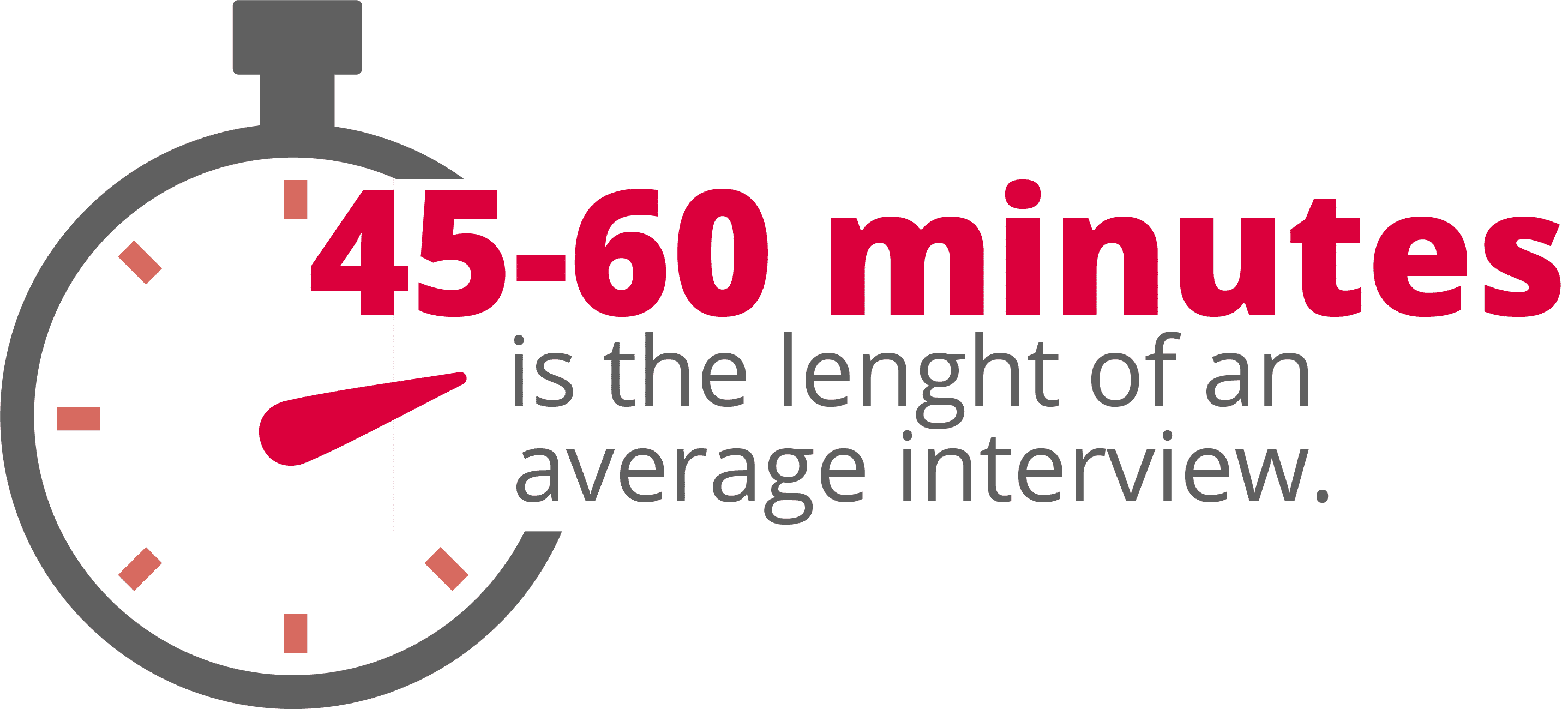
Consider enlisting the help of a friend to play the part of the interviewer so you can practice your responses. The average job interview lasts between 45 and 60 minutes, so you want to make sure to have at least 45 minutes of material prepared.
How to Respond to Interview Questions
Let’s talk about the general strategy for answering interview questions.
Every interview question gives you a chance to express why you are the best person for the job.
The basic idea is to highlight positive attributes and avoid giving employers cause for worry.
STAR Interview Method
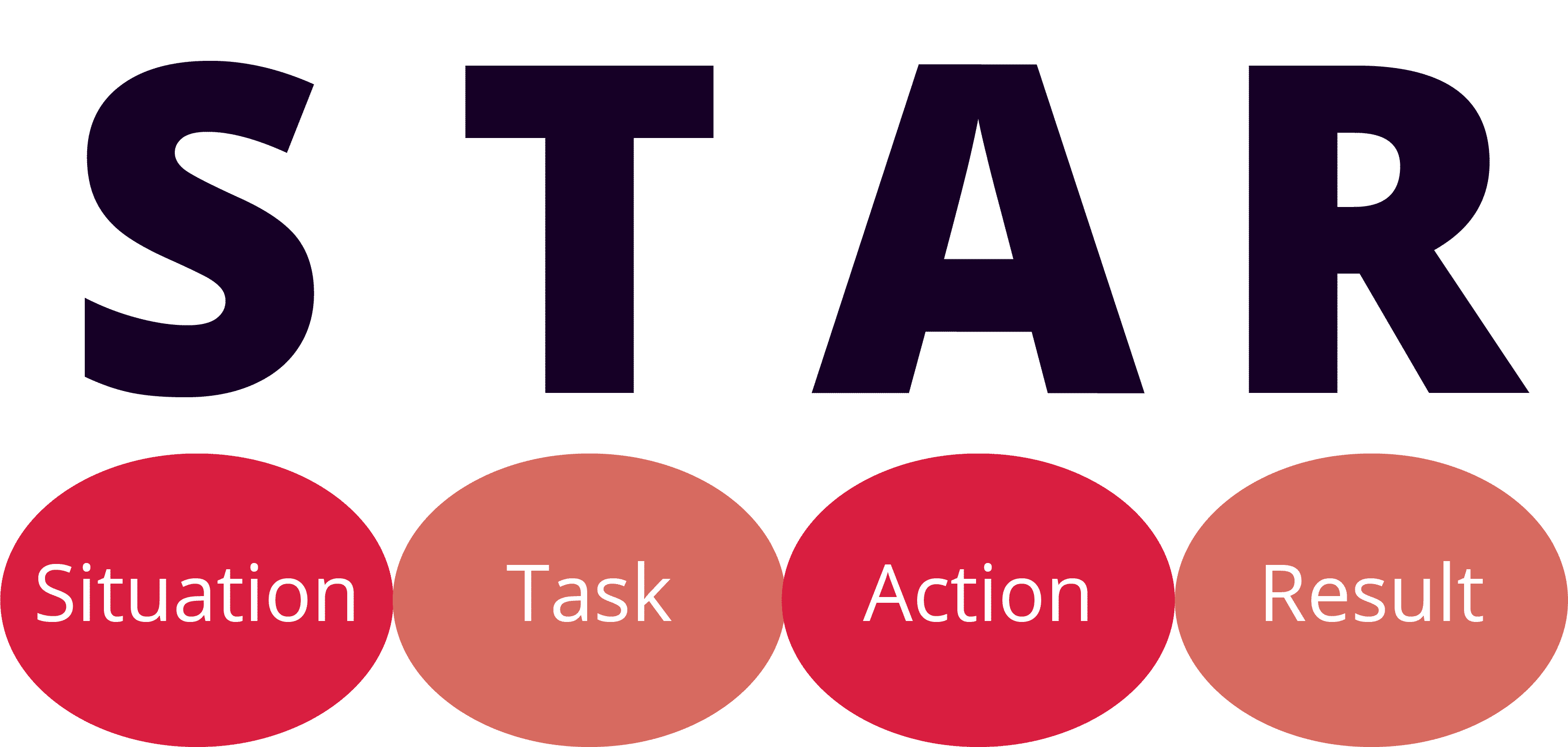
A widely used method to teach candidates how to respond to interview questions is the STAR (situation, task, action, result) interview method.
The STAR method is focused around using real-world examples to highlight your skills, abilities, and character traits.
Most interviews are largely composed of behavioral questions – questions that concern how you have behaved in previous work situations.
Employers ask behavioral questions to gauge how you handled situations in the past, which serves as an indicator of how you will handle similar issues in the position.
Rather than a simple yes or no question, behavioral questions are more open-ended and draw from your personal experiences.
Some examples of behavioral questions may be:
- Describe a time you dealt with a conflict between coworkers and how you dealt with it.
- Share an example of a time you had to make a hard decision. What did you do?
- Tell me about a time you received a specific goal.
- Tell me a time when you failed. What did you learn from this experience?
- Share an example of a time you used logic or data to recommend something.
The STAR method is a way to practice responding to these types of questions. It provides a clear-cut and easy to follow method to create a story with a conflict and resolution.
Situation
You need to start by providing the details and context surrounding the difficult situation you faced.
Clearly describe the problem, who was involved, what the consequences were, and any other relevant details.
For instance, “In my last job as a senior engineer, we were short-staffed and facing a large backlog of projects. Our clients were setting unrealistic deadlines that were causing my design team a lot of stress and decreasing morale.”
Task
Give information regarding your responsibility and role in the situation. What duties were you required to perform and how were they relevant to your situation?
For instance, “As the senior engineer on the project, it was my responsibility to manage my team’s time to meet deadlines, keep my team’s morale high, and communicate our progress to our clients.”
Action
With explicit detail, describe what steps you took towards managing the conflict. What actions did you take? How did you handle the task at hand? How did you coordinate with others?
For instance, “I instituted a formal process for creative requests that included timeline expectations to better coordinate our efforts. I also scheduled one-on-one meetings with my team members and clients to discuss project progress and maintain productivity.”
Result
What happened in the situation? What outcomes resulted from your actions? Try to quantify the results of your experience to demonstrate the effectiveness of your efforts.
According to Talentworks resume statistics, using quantifiable figures in resumes and interviews gives you a 40.2% boost over other candidates [12].
As an example, “By providing a better channel for team cooperation, we were able to shift our priority list to complete all our projects. Further, our productivity increase allowed us to cut our average project time-length by 3 days.”
Using the STAR Method
Most of the time you won’t have access to interview questions ahead of time, so you will have to use some creativity to practice.
Most behavioral questions focus on work-related scenarios; situations that demonstrate adaptability, critical thinking, leadership, performance under pressure, and time-management skills.
Read the job description and take note of the required skills and described duties. Ask yourself, what kinds of issues are your likely to run into considering the position and what obstacles will you likely face.
Wrack your brain and think of any relevant situations from your work experience that demonstrate the kinds of qualities you will need to be successful.
For candidates that do not have that much experience in the workforce, draw on examples from internships, volunteer projects, community service, or group projects in school.
Sometimes employers will specifically ask about a non-work situation, so it is a good idea to consider problems in your personal life you have overcome.
Again, the point of the STAR method is to focus on specific examples of problems you have solved in the workplace; that is what employers want to hear about. Your education credentials are nice, but some hiring managers see overeducation as a barrier to the culmination of a job-worker match [13].
And that is really all there is to it.
Using the STAR method, you have a widely applicable formula for generating good examples that demonstrate your skills, abilities, and work persona.
STAR Method Examples
Here are some examples of using the STAR method to answer popular interview questions.
How to Respond to Interview Questions
Let’s talk about the general strategy for answering interview questions.
Every interview question gives you a chance to express why you are the best person for the job.
The basic idea is to highlight positive attributes and avoid giving employers cause for worry.
STAR Interview Method
Click edit button to change this text. Lorem ipsum dolor sit amet, consectetur adipiscing elit. Ut elit tellus, luctus nec ullamcorper mattis, pulvinar dapibus leo.
“I was working as a team manager in a design firm, and we were approaching the final deadline for a project for an important client.
About 4 days before the deadline, one of my senior members on the team abruptly quit.
Although I was managing a full load of tasks, I absorbed my former coworker’s tasks, or else we would not have reached our deadlines.
By working nights and weekends for the next few days, I was able to complete all the required tasks before the project deadline.
Our client was so impressed they immediately contracted us for another design project.”
“Working as a manager at a high-end restaurant, I was responsible for scheduling private events for our customers.
Once, I accidentally switched the dates of two reservations, and our room was not prepared when the first party arrived.
I was able to gather extra staff to quickly set up the private back room, while I had the bartender serve complimentary drinks to the party as they waited.
After apologizing directly to the customer who set up the event, I was able to secure another reservation for a private event from the same customer.”
“I was working as an intern for X company, where I was responsible for strategizing with clients content for their websites.
Our client’s focus was seeking to generate new content for their business blog with the goal of raising their search engine results and retaining clients.
With the use of different analytical tools, I was able to identify trending content relevant to the client’s niche and incorporated that into various aspects of their website copy.
Through my efforts at content strategizing, we were able to increase client retention by almost 24% in the following 3 months.”
With respect to behavioral questions, the STAR method is a sure-fire way to give a coherent and directed response that concisely shows your aptitude for the job.
Other General Tips for Interviewing
Along with using the STAR method to practice for interviews, keep in mind the following considerations as you prepare.
Be Concise
You do not need to give 20 different examples of how you saved your previous workplace: just one or two good examples will suffice. In fact, long-winded rambling answers are always a bad idea and run the risk of coming off as fake and forced.
Be concise and clear with your answers; say just enough to fully answer the question. Interview question responses should never go over 60 seconds.
Be Authentic
While there is certainly a reason for proper decorum, there is no point putting on a fake face and trying to be someone you are not.

Interviewers appreciate authenticity, they do not want you to just say what you think they want to hear. Be honest with your answers. That does not mean you cannot slightly embellish your achievements to emphasize your qualities, but in no case should you just straight up make up a fictional scenario.
Studies show that experienced interviewers are rather good at picking up when candidates are fibbing on their resumes or during interviews [14].
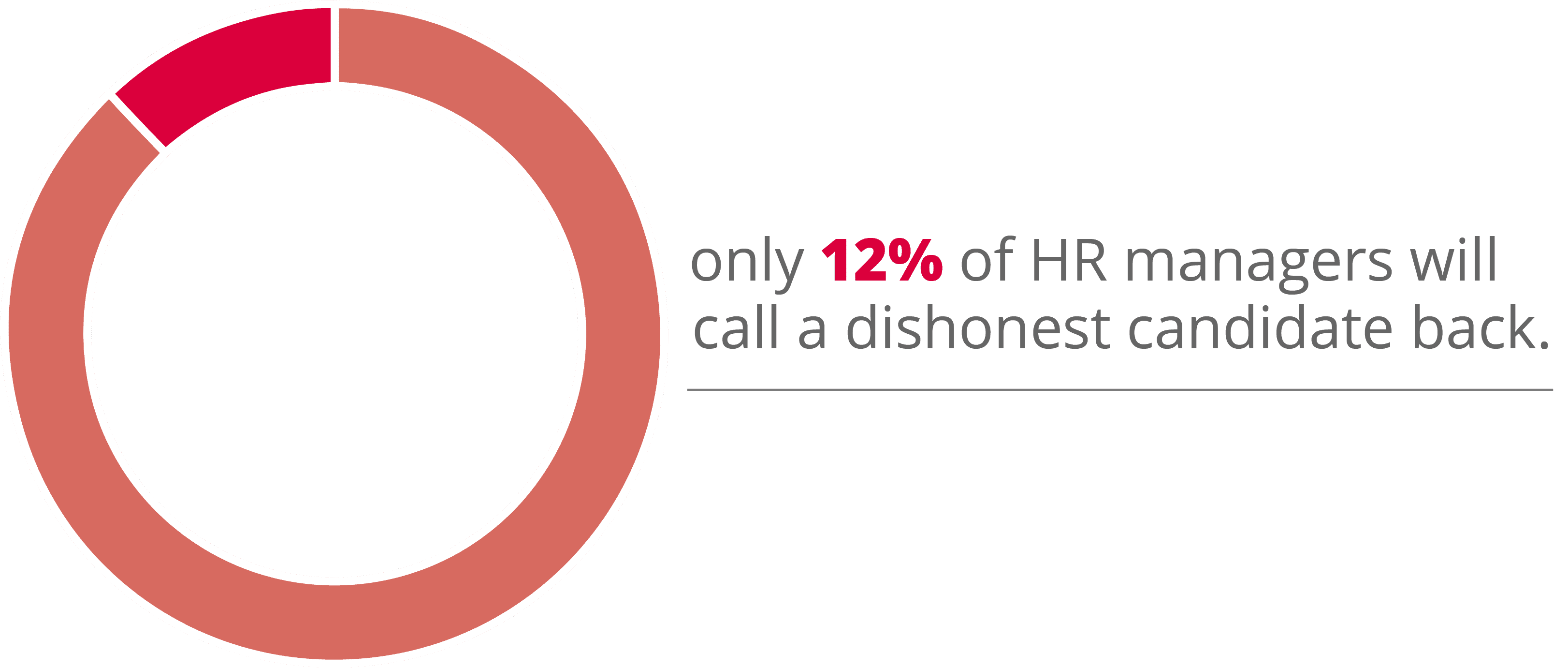
Don’t Be Afraid to Ask Questions
Interviewers will not expect you to know everything going into the interview.
They want to see that you are as interested in the company as they are in you.
That is why you should never shy away from asking relevant questions about the position and work culture.
Interviewers interpret good questions as you taking a firm interest in the company and as a sign that you did your homework.
Emphasize Positive Character Traits
Perhaps a bit surprisingly, the number one thing interviewers look for is not general mental ability or even your level of skill for a particular profession. In actuality, hiring managers tend to favor personality traits like agreeableness, conscientiousness, and emotional stability [15], even though general mental ability is actually a better predictor of job performance. So all your responses should be oriented around providing examples of these kinds of character traits, along with emphasizing your skills and abilities.
Don’t Rush Your Answers
Before giving your answer to a particular question, take some time to think about your response. You do not want to start firing off a preplanned script immediately after the interviewer poses the question. Pause a few seconds to compose yourself before you answer so you can respond effectively and not accidentally skip over any important things you want to say.
Keep Things Professional
Bonding with an interviewer over a mutual interest, such as a love of rock climbing, is a good way to build rapport with the interview committee, but overall you should try to keep it professional and avoid spending a good time talking about your personal life, interests, or hobbies.
Importantly, it is best to not bring up any work-related issues you may have if you get the job, such as transportation or child-care issues.
Know Your Rights
It is important to realize that even as just a job candidate, there are certain rules the company has to abide by in the process of interviewing you.
In fact, there is a whole bevy of questions that are illegal for employers to ask you as they could be used to discriminate against protected groups in hiring.
For example, interview committees are not allowed to ask if you are a homeowner, citizen, if you have a disability or any other medical information, whether you are married and have children, how much you weigh, or questions about religion or nationality.
Before your interview, take some time to review what questions are not allowed to be asked on the US Office of Equal Employment Opportunity Commission’s website here.
In general, employers are prohibited from asking questions about:
- Age
- Race
- Gender
- Religion
- National origin
- Marital status
- Financial status
- Disability and medical conditions
Even though interview questions on the above criteria are illegal, employers sometimes still approach the topic in an indirect manner.
They may phrase questions to sound neutral as they could get in a lot of trouble if they get caught for discriminatory hiring practices.
Here are a few strategies for handling illegal interview questions:
Provide a brief answer that sets limits to the topic.
If the interviewer still presses, tell them you are willing to answer but are not sure how it is relevant to the task at hand.
That gives them a chance to explain their thinking.
Address the “question behind the question.” For example, if they ask “are you financially stable?” answer that you can meet job obligations without fail. All your answers should be about emphasizing your skill.
If you think the question is trying to establish if you can meet job obligations, draw attention to multitasking and time-management skills, for example.
If the potential employer asks you something you perceive to be incredibly offensive, it is a good bet you shouldn’t want to work for them.
If you feel discriminated against during the interview process, you can file a complaint with the Equal Employment Opportunity Commission.
Types of Questions
Even though every interview is unique, there are a handful of common questions you should prepare for.
Question 1. “Tell Me About Yourself”
The interviewers will likely start off with a question about your experience and background.
Begin by providing them a varied overview of your current position and responsibilities, and then highlight the most important and relevant details from previous jobs and your background.
Do
Focus on your most recent job and provide specific examples that demonstrate the kind of work and responsibilities you have.
Focus on aspects of your professional career that are the most relevant for the position in question.
Try to focus on details that you can quantify
Briefly mention your hobbies, education, and community involvement.
Don't
Mention info related to your marital status, religion, or national origin.
Avoid summarizing your resume word for word. Interviewers have already seen that. They want to hear about your experiences in your own words.
Avoid vague generalizations; e.g. “I am a hard worker” or “I excel in problem-solving.” Employers want to hear about your previous experience, not just your character traits.
Question 2. “Why Do You Want The Job?”
Like the common “tell me about yourself” question, “why do you want this job?” is another ambiguous question that can be hard to answer.
Even if they do not explicitly ask this question, there is no way to get around having to talk about what motivated you to apply.
Do
Express enthusiasm for the company. This is an excellent opportunity for you to show off what you know about the company and position.
Mention how the job opening reflects yous skills and expertise.
Explain how the job fits into your overall career goals. You want to show that the job makes sense regarding your desired career trajectory. Employers like candidates who have an eye trained on the future.
Don't
Don't give a generic response like “I want to give back to my community.”
Provide specific examples of what you want to accomplish and how the job will help you accomplish those goals.
Do not give money or salary as a reason for applying. While there is nothing wrong with negotiating for a good salary, employers want to see you are interested in the position for reasons aside from the paycheck.
Question 3. “What Are Your Greatest Professional Strengths?”
A lot of people dislike talking about themselves, even more so when they have to talk up their positive attributes. This question is one of the best points to talk about specific experiences that illustrate your desirable qualities.
Do
Provide specific examples from previous jobs that demonstrate your strengths. Specific examples provide concrete situations that show how you will actually act in a given circumstance.
Choose 3 of your strongest attributes to focus on. These attributes should be the ones most relevant to the job. For example, if you are interviewing for a management position, focus on your leadership qualities.
Be honest with your assessments. A little bit of embellishment is fine, but don;t just say what you think the interviewers want to hear.
Don't
Do not just list a string of positive attributes. Stick to a few key qualities and focus on those.
Do not leave your response generic. Provide specific examples that demonstrate your qualities.
Avoid focusing too much on any one quality. Your assessment should give equal time to the different qualities you choose to talk about.
Question 4. “Tell Me About a Challenge or a Conflict You’ve Faced at Work.”
This is one of the questions where the STAR method comes most in handy.
Providing examples of specific conflicts is a good way to demonstrate your strengths.
You need to be certain to keep the story clear, concise, and make sure it illustrates the spirit of the question.
Do
Give specific examples. Remember the STAR method; give the situation, task, action, and result.
Pick a story that represents the soft skills as specified in the job description.
Think about the “question behind the question.” Interviewers don't just want to know about a difficult time you faced at work; they are primarily trying to gauge how you handle yourself under pressure.
At the end of the story, reiterate how your conduct fits into the company values and positions duties.
Don't
Do not be vague. Try to provide all relevant details in your story.
Do not be afraid to talk about failure. Interviewers also want to know how you handle failure and how you modify your behavior to prevent failure.
Do not ramble. Have a clear idea of what you want to say and say it concisely.
Question 5. “What Type of Work Environment Do You Prefer?”
Company culture is an important part of hiring decisions.
In fact, studies seem to suggest that work culture fit is more important to hiring managers than technical competency in some situations [16]. Hiring managers don’t only want to know if you can do the job but if you are a good fit for the company.
Do
Before the interview, go through the companies' social media pages and the profiles of employees to get an idea of what kinds of things the company values.
Be on the lookout for red flags about company culture (ex. A high employee turnover rate).
Take a beta survey that uses “psychometric frameworks” to determine in which workplaces you would thrive.
Don't
Do not just consult employees. Speak with customers, suppliers, partners, and anyone else who can give you relevant information about the company culture.
Do not just ask interviewers what it is like to work at the company. Instead, rephrase and ask questions about what clients and suppliers would say about the company.
Question 6. “Where Do You See Yourself in 5 Years?”
At first glance, this question may seem odd. After all, you are interviewing for a position now.
Why would employers want to know about your future plans after you may have left the company?
Think about where the position could take you in the future, or how you want to use the position as a stepping stone for your career.
Do
Be honest. Give them realistic expectations for your career. Employers want to know what kinds of ambitions you have for the future.
Explain how the current position is relevant to you achieving your future goals.
Don't
Don’t say something like “running this place” or “in your position” as an answer.
Don’t signify that the position is simply a means to an end for you. While employers want to see professional ambitions, they do not want you to consider the position only in terms of instrumental value.
19 Tips from Career Experts
We’ve contacted over 50 well known career specialists and asked if they had any advice for those that are preparing for a job interview. We have summarized their responses into 19 tips which are presented below.
1. Dress Well
Keep the sugar dripping from your morning coffee cup off your hands, look professional, but lose the sitting-on-the-subway stiffness and make your face and hair Oscar worthy, not just selfie ready.

Research the organisation and wear clothes that fit perfectly.

Generally, dressing professionally and being well groomed is preferable. If things still seem unclear, you can always drop the recruiter a call and enquire about it.

2. Ask Questions
Ask about a specific program they recently launched. Anything that gets you into a more in-depth conversation is ideal.

Instead ask questions that show you know something about the company and/or the industry. Something like “The industry has been growing really fast and obviously you have too—how has this affected this department?” will really show that you’ve done your research.



Before the interview write down questions and bring them with you. If you are nervous it’s ok to refer to your list during the interview. It just shows that you came prepared.


Make sure you have your own questions about the company, the job, and your role inside of that.
You should have a clear set of criteria about what makes something the right job for you, and ask questions so that you feel confident you’ll both be happy if you do get hired.


You should ask the interviewer questions about the company and position to show you are truly interested.
Here are a few you can use:
- What is the career path for someone starting in this position?
- What skills do people who are successful in this position typically have?
- I was reading about the company’s latest product launch “X”. What was this positions role in the success of the launch?
- I really enjoy learning new skills. Is there an opportunity to cross-train or join different projects in the future?

Think what you’ve learned about the company so far, what you may have read in the press. What will deepen your understanding of the role/company and also show how embedded into their world you already are?

3. Research
So many times I would sit down to conduct an interview and find that I needed to explain in detail the job and the company prior to diving into the interview questions. Wasted time and energy that leaves a negative image.


Know their products and their ambitions and their competitors.
Understand their values and culture. Don’t parrot it back to them—they know it already—but use this background to show that you understand what they are going for and how they do it do it—and to show that that is just what you want to be a part of.

Using the skills of a stalker, dig into the company website, Google, LinkedIn, Facebook pages of your interviewer, etc. to see what you can learn.
Imagine that you are already an employee and generate a list of some new ideas for the company and some insights about the competition. Then, work that knowledge in during the interview to convince the hiring manager that you can hit the ground running.
Your conversation will be a lot more engaging if you have something meaningful to add and the interviewer will have some substantive reasons to take your candidacy forward.

Read the latest annual report. See what’s putting them in the news or at least their latest press releases. And then work some of this knowledge into your interview.
You need to draw a line between the work you intend to for the company and their broader goals.

What challenges is the industry facing currently? Is the market growing or shrinking? Where does this company fit in? Even if you’re going for an entry-level position, knowledge is always power.


I’ve heard of people who don’t know what the organization does or have not read recent news articles on the organization.

In most cases you can find information about the company from its website. If you know who your interviewers are in advance, look up their profile on social networks such as Linkedin. Take with you extra copies of your resume, a list of references, a notebook and a pen.

If you do your homework and take the time to really check out who you’ll be talking to, you will have more to talk to them about and will have a better chance of connecting with them.
Take a look at their LinkedIn profile, talk to people who may know about the company, work there, have worked there, and have worked with the person about to interview you.

4. Practice
Practice out loud, in front of a friend or career advisor, or on camera. Make sure you’re paying close attention to the clarity and relevance of your responses, and also observe your body language.


Some of the questions you’ll be asked will pop up at every kind of job interview.
There may be some variation in the phrasing, but you can almost guarantee that you will be asked: "What made you apply for the job?", "What can you bring to it?", "What are your strengths and weaknesses?", and "What do you do outside of work?" Prepare your answers to these questions thoroughly to ensure that, if or when they are asked, you are giving the best possible answer you can.

There are only three questions every interviewer actually wants to know. – One, “Can you do the job?” Two, “Will you enjoy the job?” And three, “Will you like working here?“. Frame your answers around these three points to help the interviewer feel more comfortable picturing you in the role.
Be prepared for tricky questions. "If you were a tree, what kind of tree would you be?" We’ve all heard of odd interview questions so mentally begin to prepare yourself.
It boils down to assessing and knowing your strengths and weaknesses. Before the interview, make a list of any weaknesses you have and how they could actually be a positive e.g. “I am very focused on details however I’ve found that through double checking and analyzing again, I have been able to identify additional cost savings by….”

5. Be Confident
Choose confident wording and limit your use of filler words. Don’t be afraid to demonstrate your accomplishments. Adopt these interview behaviors and you’ll convince the hiring team that you can do the job.

There’s a fine line between cockiness and confidence. Look interested, but not desperate. Look capable, but not overcompensating.

6. Be Yourself

The right company will like you for who you are. Save yourself this trouble and don’t try to be what you think they want. Instead, be yourself.


If you are not genuine in an interview, then you risk looking phony.
Even worse would be that they believe you and hire you for something with expectations than you can’t actually deliver on.
If you do a good job of representing yourself accurately, then you will find an organization with a culture that you fit into.

7. Bring Your Best Self
Try to truly be yourself, though obviously the best version of yourself. Don’t make things up or feign interest.
Be honest about what excites you about working there and how you think you would fit in.
You don’t want them to hire the fake you, and then feel like you have to wear a mask to work if you get the job.

8. Know How To Sell Yourself
When asked about their past positions they should be able to relate what they did for a previous company to what they can do for the new company.

9. Tell Stories

The more stories or examples of you as a professional you can offer them, the clearer their picture will be of you working for their company.

Give them concrete examples of how you have used your skills, preferably in situations similar to those you’d find yourself in at your new job.
Moreover, be ready with LOTS of different examples that you could use regardless of what questions you may be asked.

If the company is looking for an assistant project manager who excels at jugging lots of balls in a fluid, organized way—tell a story about how you came in to a troubled project mid-way and unraveled the ball of string—creating an organized schedule and flow that helped bring the project in early.

Select the stories that will illustrate those qualities they are looking for. Tell them in a lively and vivid way. Don’t get into the weeds of process unless it’s really relevant. Tell of the outcomes of the work. Your passion and the specific things you choose to talk about should clearly show your value.


10. Smile
Make a conscious effort to occasionally smile and laugh. The same thing goes for phone interviews! They won’t see your smile, but they’ll hear it in the subtle changes in your tone of voice. When you’re smiling, you instantly sound more positive.

11. Follow Up
That way you can send thank you emails immediately after you leave. Remember to add something unique about the interview that you remember and show your enthusiasm for the role and company in the thank you letter. Make it short and sweet.


Once you do get the interview, you need to take full advantage of the opportunity by having a unique follow up.
Most of the people who interview will send some sort of follow up email or letter. Take it a step further and do something that will make it impossible to ignore you.
I once had a phone interview where the person had to quickly get off the call because the fire alarm went off. We rescheduled later that day and completed the call. Instead of a follow up letter, I sent her a small fire fighter figurine ($5) with a note saying how I enjoyed the conversation and looked forward to hearing more about the position. This worked extremely well!

Take notes on specific points each interview makes when meeting with you. After the interview, follow up with a thank you note that also includes an additional item of how you can help them with that specific point. For example, an interviewer may tell you that staying within budget is important in the company.
Take note and follow up with a customized thank you note that says something like “I appreciate the point you made about staying on budget is important. You might like to know that one of my accomplishments was that I was able to stay under budget by 5% in a project I managed.”
This step will impress interviewers with your ability to listen, give them one more chance to see what you can do, and help give you an extra edge above the competition.

12. Listen


Be genuinely curious about where they are headed. Have a couple of smart questions lined up to learn more about their goals and about what they hope you will bring them.
Make sure they are questions you should not already know the answers to. Be excited about what you can do for them.

What do they want to know, what are they asking for from you and what are their thoughts and opinions on different situations.
Often in an interview we can end up talking too much – sometimes trying too hard to sell ourselves and more often than not we end up not answering the question and not listening hard enough to what the interviewer is saying.
Give them a chance to speak, don’t talk over them and think before making your contribution. Make sure that you’ve understood the question and don’t be afraid to ask for clarification if anything seems unclear to you.

13. Understand Their Problem


14. Be Careful When Talking About Money
You can say “commensurate with responsibilities” or put a fair starting figure. If that was not required of you and they are asking you to disclose how much you want—the safest thing to do is to give a wide range based on where you have been (for the last several years I have been in the mid to high five figures) and then follow up with a question of your own: “since we are on the subject did you have a range in mind budgeted for this position?”

15. Connect
Use your research and a quick scan of the office to find some common ground to start building a relationship from the moment your eyes sync.
Mine those social media pages to uncover what they are passionate about and get some conversation going. A posting on Facebook about Little Johnny’s success at last month’s Pinewood Derby contest is perfect, for example, if you have Scouts in common, but there are many more possibilities by just being a little bit curious.

Mirror what the interviewer does because people like to hire people like themselves.

16. Remember That They Want To Hire You

17. Don’t Look Desperate

18. Arrive Early

Watch their faces and their posture; listen to their conversation. Is it energetic and excited? Read posters and signs–what is the company currently focused on? The more you observe, the more you can target your questions and followup actions accordingly to show how you’d fit in and make a difference

19. Relax and Take Your Time
You practiced interviewing and you are ready for any environment and any situation.
You did a lot of company research and have good questions prepared to ask.
You put in the hard work and there’s nothing more you can do.
At this point, there’s nothing to worry about so let go of your fears.
Relax, be confident, be yourself and let it happen. You know your stuff. You’ve got this.

Combine the fact you’re probably already nervous with being asked a question you never expected to encounter and it’s only natural to get flustered. In this situation—one that arrives in almost every job interview you will attend—it’s imperative that you fight the instinctive urge to fumble your way through a poor answer as it comes to you. Inhale a deep breath, collect your thoughts and take the time to develop a good answer.
Interviewers will appreciate candidates that work well under pressure and are able to remain confident.

Conclusions
We know that interviewing for a job can be very stressful.
With the right preparation, you can ace the interview and be a shoo-in candidate for the job.
So before your interview, make sure to take sufficient time to make the right preparations and practice your interview questions. Remember the STAR method and focus on telling stories that emphasize your professional skills and qualities.
With enough practice, you can walk into the room on interview day with your head held high. As with many things, confidence is key.
Do not be overly humble about your achievements, but do not be afraid to slip into arrogance.
Finding the right balance is the key to having an excellent job interview.
- “Anxiety.org. “Study Finds 92% of U.S. Adults Have Job Interview Anxiety.” Anxiety.org, 4 Sept. 2016, https://www.anxiety.org/adults-anxiety-job-interviews. Accessed 26 August 2019. [↑]
- Workopolis. “Why Only 2% of Applicants Actually Get Interviews.” Workopolis, 27 Feb. 2018, https://careers.workopolis.com/advice/only-2-of-applicants-actually-get-interviews-heres-how-to-be-one-of-them. Accessed 26 August 2019. [↑]
- “The NCES Fast Facts Tool Provides Quick Answers to Many Education Questions (National Center for Education Statistics).” National Center for Education Statistics (NCES) Home Page, a Part of the U.S. Department of Education, https://nces.ed.gov/fastfacts/display.asp?id=561. Accessed 30 September 2019 [↑]
- Chamberlain, Andrew. “How Long Does It Take to Hire? Interview Duration in 25 Countries.” Glassdoor Economic Research, 21 Sept. 2017, https://www.glassdoor.com/research/time-to-hire-in-25-countries/. Accessed 26 August 2019 [↑]
- Frieder, Rachel E., et al. “How Quickly Do Interviewers Reach Decisions? An Examination of Interviewers’ Decision‐Making Time across Applicants – Frieder – 2016 – Journal of Occupational and Organizational Psychology – Wiley Online Library.” Journal of Occupational and Organizational Psychology, John Wiley & Sons, Ltd (10.1111), 11 Apr. 2015, https://onlinelibrary.wiley.com/doi/abs/10.1111/joop.12118. Accessed 26 August 2019 [↑]
- Barrick, Murray R., et al. “ACCURACY OF INTERVIEWER JUDGMENTS OF JOB APPLICANT PERSONALITY TRAITS – BARRICK – 2000 – Personnel Psychology – Wiley Online Library.” Personnel Psychology, John Wiley & Sons, Ltd (10.1111), 7 Dec. 2006, https://onlinelibrary.wiley.com/doi/abs/10.1111/j.1744-6570.2000.tb02424.x. Accessed 26 August 2019 [↑]
- Johnson, Stefanie K, et al. “Physical Attractiveness Biases in Ratings of Employment Suitability: Tracking down the ‘Beauty Is Beastly’ Effect.” The Journal of Social Psychology, U.S. National Library of Medicine, 2010, https://www.ncbi.nlm.nih.gov/pubmed/20575336. Accessed 26 August 2019 [↑]
- Teschke, Rabea, and Katja Mierke. “Nice Talk! How Physical Attractiveness Affects the Impact of Company Presentations.” Hochschule Fresenius University of Applied Sciences, Journal of Business and Media Psychology, http://journal-bmp.de/2015/12/nice-talk-wie-physische-attraktivitat-die-wirkung-von-unternehmensprasentationen-beeinflusst/?lang=en. Accessed 26 August 2019 [↑]
- Brown, Victoria R., and Edwin Daly Vaughn. “The Writing on the (Facebook) Wall: The Use of Social Networking Sites in Hiring Decisions – Semantic Scholar.” SemanticScholar, 2011, https://www.semanticscholar.org/paper/The-Writing-on-the-(Facebook)-Wall:-The-Use-of-in-Brown-Vaughn/0a2e027f9a745d7cf7074849c6b7e1615ee894a6. Accessed 26 August 2019 [↑]
- Jobvite. “Jobvite Infographic: Watch What You Post on Social Media.” Jobvite, 15 Sept. 2017, https://www.jobvite.com/employment-branding/jobvite-infographic-watch-post-social-media/. Accessed 26 August 2019 [↑]
- GMAC Research Team. “Employers Seek Communication Skills in New Hires.” Mba.com, 1 Jan. 2018, https://www.mba.com/articles-and-announcements/articles/your-career-path/employers-seek-communications-skills. Accessed 26 August 2019 [↑]
- Chakrabarti, Kushal. “The Science of The Job Search, Part I: 13 Data-Backed Ways To Win.” TalentWorks, 6 Apr. 2019, https://talent.works/blog/2018/01/08/the-science-of-the-job-search-part-i-13-data-backed-ways-to-win/. Accessed 26 August 2019 [↑]
- Bills, David B. “The Mutability of Educational Credentials as Hiring Criteria: How Employers Evaluate Atypically Highly Credentialed Job Candidates – DAVID B. BILLS, 1992.” SAGE Journals, 1 Feb. 1992, https://journals.sagepub.com/doi/abs/10.1177/0730888492019001005. Accessed 26 August 2019 [↑]
- Nova, Annie. “This Job Applicant Said He Was a CIA Spy; He Didn’t Get the Job.” CNBC, 16 Sept. 2017, https://www.cnbc.com/2017/09/13/75-percent-of-human-resource-managers-have-caught-a-resume-lie.html. Accessed 26 August 2019 [↑]
- Tews, Michael J., et al. “What Matters Most? The Perceived Importance of Ability and Personality for Hiring Decisions – Michael J. Tews, Kathryn Stafford, J. Bruce Tracey, 2011.” SAGE Journals, 27 Apr. 2010, http://journals.sagepub.com/doi/10.1177/1938965510363377. Accessed 26 August 2019 [↑]
- Grigoryev, Patty. “Hiring by Competency Models.” The Journal for Quality and Participation, 2006, https://search.proquest.com/openview/cc18d0ca96e55b6858e750d7b18d5e9c/1?pq-origsite=gscholar&cbl=37083. Accessed 26 August 2019 [↑]
- SHRM. “Average Cost-per-Hire for Companies Is $4,129, SHRM Survey Finds.” SHRM, 19 May 2017, https://www.shrm.org/about-shrm/press-room/press-releases/pages/human-capital-benchmarking-report.aspx. Accessed 26 August 2019 [↑]
